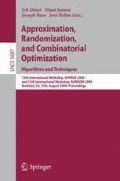Abstract
In this paper, we provide a polylogarithmic bound that holds with high probability on the insertion time for cuckoo hashing under the random-walk insertion method. Cuckoo hashing provides a useful methodology for building practical, high-performance hash tables. The essential idea of cuckoo hashing is to combine the power of schemes that allow multiple hash locations for an item with the power to dynamically change the location of an item among its possible locations. Previous work on the case where the number of choices is larger than two has required a breadth-first search analysis, which is both inefficient in practice and currently has only a polynomial high probability upper bound on the insertion time. Here we significantly advance the state of the art by proving a polylogarithmic bound on the more efficient random-walk method, where items repeatedly kick out random blocking items until a free location for an item is found.
Access this chapter
Tax calculation will be finalised at checkout
Purchases are for personal use only
Preview
Unable to display preview. Download preview PDF.
References
Azar, Y., Broder, A., Karlin, A., Upfal, E.: Balanced Allocations. SIAM Journal on Computing 29(1), 180–200 (1999)
Broder, A., Karlin, A.: Multilevel Adaptive Hashing. In: Proceedings of the 1st ACM-SIAM Symposium on Discrete Algorithms (SODA), pp. 43–53 (1990)
Broder, A., Mitzenmacher, M.: Using Multiple Hash Functions to Improve IP Lookups. In: Proceedings of the 20th IEEE International Conference on Computer Communications (INFOCOM), pp. 1454–1463 (2001)
Devroye, L., Morin, P.: Cuckoo Hashing: Further Analysis. Information Processing Letters 86(4), 215–219 (2003)
Dietzfelbinger, M., Weidling, C.: Balanced Allocation and Dictionaries with Tightly Packed Constant Size Bins. Theoretical Computer Science 380(1-2), 47–68 (2007)
Fotakis, D., Pagh, R., Sanders, P., Spirakis, P.: Space Efficient Hash Tables With Worst Case Constant Access Time. Theory of Computing Systems 38(2), 229–248 (2005)
Kirsch, A., Mitzenmacher, M.: Using a Queue to De-amortize Cuckoo Hashing in Hardware. In: Proceedings of the Forty-Fifth Annual Allerton Conference on Communication, Control, and Computing (2007)
Kirsch, A., Mitzenmacher, M., Wieder, U.: More Robust Hashing: Cuckoo Hashing with a Stash. In: Proceedings of the 16th Annual European Symposium on Algorithms, pp. 611–622 (2008)
Kirsch, A., Mitzenmacher, M.: The Power of One Move: Hashing Schemes for Hardware. In: Proceedings of the 27th IEEE International Conference on Computer Communications (INFOCOM), pp. 565–573 (2008)
Kutzelnigg, R.: Bipartite Random Graphs and Cuckoo Hashing. In: Proceedings of the Fourth Colloquium on Mathematics and Computer Science (2006)
Mitzenmacher, M., Vadhan, S.: Why Simple Hash Functions Work: Exploiting the Entropy in a Data Stream. In: Proceedings of the Nineteenth Annual ACM-SIAM Symposium on Discrete Algorithms (SODA), pp. 746–755 (2008)
Pagh, R., Rodler, F.: Cuckoo Hashing. Journal of Algorithms 51(2), 122–144 (2004)
Vöcking, B.: How Asymmetry Helps Load Balancing. Journal of the ACM 50(4), 568–589 (2003)
Author information
Authors and Affiliations
Editor information
Editors and Affiliations
Rights and permissions
Copyright information
© 2009 Springer-Verlag Berlin Heidelberg
About this paper
Cite this paper
Frieze, A., Melsted, P., Mitzenmacher, M. (2009). An Analysis of Random-Walk Cuckoo Hashing. In: Dinur, I., Jansen, K., Naor, J., Rolim, J. (eds) Approximation, Randomization, and Combinatorial Optimization. Algorithms and Techniques. APPROX RANDOM 2009 2009. Lecture Notes in Computer Science, vol 5687. Springer, Berlin, Heidelberg. https://doi.org/10.1007/978-3-642-03685-9_37
Download citation
DOI: https://doi.org/10.1007/978-3-642-03685-9_37
Publisher Name: Springer, Berlin, Heidelberg
Print ISBN: 978-3-642-03684-2
Online ISBN: 978-3-642-03685-9
eBook Packages: Computer ScienceComputer Science (R0)

